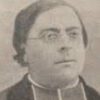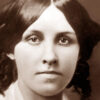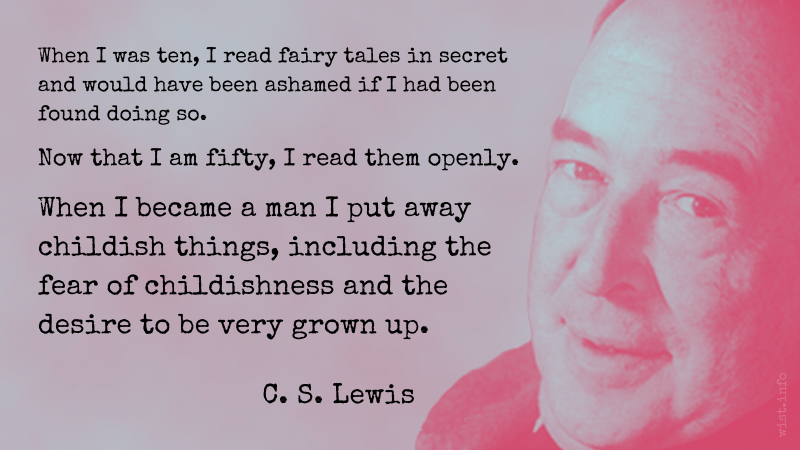In youth our judgments are obscured by our hopes; in age, by our regrets.
Paul Eldridge (1888-1982) American educator, novelist, poet
Maxims for a Modern Man, #144 (1965)
(Source)
Quotations about:
age
Note not all quotations have been tagged, so Search may find additional quotes on this topic.
Therefore it is fitting for the women to be married at about the age of eighteen and the men at thirty-seven or a little before — for that will give long enough for the union to take place with their bodily vigor at its prime, and for it to arrive with a convenient coincidence of dates at the time when procreation ceases. Moreover the succession of the children to the estates, if their birth duly occurs soon after the parents marry, will take place when they are beginning their prime, and when the parents’ period of vigor has now come to a close, towards the age of seventy.
Aristotle (384-322 BC) Greek philosopher
Politics [Πολιτικά], Book 7, ch. 16 / 1335a.27 [tr. Rackham (1932)]
(Source)
Alt. trans.:
And so it is best to unite women of about eighteen years of age and men of thirty-seven or less; for by such an arrangement the union will be during their greatest physical perfection, and will, as the years pass reach the limit of child-begetting at the right time. Again, the succession of children will be secured, as the younger generation will be having children at the beginning of their prime, supposing some to be born at once, as we may expect, and as the right age has passed away from the older generation as they approach the limit of seventy years.
[tr. Bolland (1877)]
Women should marry when they are about eighteen years of age, and men at seven and thirty; then they are in the prime of life, and the decline in the powers of both will coincide. Further, the children, if their birth takes place soon, as may reasonably be expected, will succeed in the beginning of their prime, when the fathers are already in the decline of life, and have nearly reached their term of three-score years and ten.
[tr. Jowett (1885)]
For which reason the proper time for a woman to marry is eighteen, for a man thirty-seven, a little more or less; for when they marry at that time their bodies are in perfection, and they will also cease to have children at a proper time; and moreover with respect to the succession of the children, if they have them at the time which may reasonably be expected, they will be just arriving into perfection when their parents are sinking down under the load of seventy years.
[tr. Ellis (1912)]
Hence it is fitting for women to unite in marriage around the age of eighteen, and for men at thirty-seven or a little before. At such an age, union will occur when their bodies are in their prime, and will arrive at its conclusion conveniently for both of them with respect to the cessation of procreation. Further, the succession of the offspring -- if birth occurs shortly after marriage, as can reasonably be expected -- will be for them at the beginning of their prime, while for the fathers it will be when their age has already run its course toward the seventieth year.
[tr. Lord (1984)]
The ruins of himself, now worn away
With age, yet still majestic in decay.[γήραϊ τειρόμενον, μέγα δὲ φρεσὶ πένθος ἔχοντα]
Homer (fl. 7th-8th C. BC) Greek author
The Odyssey [Ὀδύσσεια], Book 24, l. 233 (24.233) [tr. Pope (1725), l. 271]
(Source)
Describing Laertes as Odysseus finds him. Gloss by Pope, as the original just describes him as "worn with age and grieving." (Source (Greek))
Thou knowest the errors of unripened age,
Weak are its counsels, headlong is its rage.[οἶσθ᾽ οἷαι νέου ἀνδρὸς ὑπερβασίαι τελέθουσι:
κραιπνότερος μὲν γάρ τε νόος, λεπτὴ δέ τε μῆτις.]Homer (fl. 7th-8th C. BC) Greek author
The Iliad [Ἰλιάς], Book 23, l. 589ff (23.589-590) [Antilochus to Menelaus] (c. 750 BC) [tr. Pope (1715-20)]
(Source (Greek)). Alternate translations:
You, more in age
And more in excellence, know well, the outrays that engage
All young men’s actions; sharper wits, but duller wisdoms, still
From us flow than from you.
[tr. Chapman (1611), l. 505ff]
Thou know’st how rash is youth, and how propense
To pass the bounds by decency prescribed,
Quick, but not wise.
[tr. Cowper (1791), l. 729ff]
Thou knowest of what sort are the errors of a youth; for his mind is indeed more volatile, and his counsel weak.
[tr. Buckley (1860)]
Thou know’st the o’er-eager vehemence of youth,
How quick in temper, and in judgement weak.
[tr. Derby (1864)]
Thou dost know
The faults to which the young are ever prone;
The will is quick to act, the judgment weak.
[tr. Bryant (1870)]
Thou knowest how a young man's transgressions come about, for his mind is hastier and his counsel shallow.
[tr. Leaf/Lang/Myers (1891)]
You know how easily young men are betrayed into indiscretion; their tempers are more hasty and they have less judgement.
[tr. Butler (1898)]
Thou knowest of what sort are the transgressions of a man that he is young, for hasty is he of purpose and but slender is his wit.
[tr. Murray (1924), l. 589-90]
It is easy for a youngster to go wrong from hastiness and lack of thought.
[tr. Graves, The Anger of Achilles (1959)]
You know a young man may go out of bounds:
his wits are nimble, but his judgment slight.
[tr. Fitzgerald (1974)]
Well you know how the whims of youth break all the rules.
Our wits quicker than wind, our judgment just as flighty.
[tr. Fagles (1990)]
BERNIE: But I did okay, didn’t I? I mean I got, what, fifteen thousand years. That’s pretty good, isn’t it? I lived a pretty long time.
DEATH: You lived what anybody gets, Bernie. You got a lifetime. No more. No less. You got a lifetime.
Neil Gaiman (b. 1960) British author, screenwriter, fabulist
Sandman, Book 7. Brief Lives, # 43 “Part 3” (1992-11)
(Source)
Only when man’s life comes to its end in prosperity can one call that man happy.
Aeschylus (525-456 BC) Greek dramatist (Æschylus)
Agamemnon, l. 928
Alt trans.:Compare to Sophocles.
- "Call no man happy till he is dead."
- "Hold him alone truly fortunate who has ended his life in happy well-being."
I am old, but I certainly have not that sign of old-age, extolling the past at the expense of the present.
Sydney Smith (1771-1845) English clergyman, essayist, wit
Memoir of the Reverend Sydney Smith, by His Daughter, Lady Holland, Vol. 1, ch. 11 (1855)
(Source)
The whiter my hair becomes, the more ready people are to believe what I say.
Bertrand Russell (1872-1970) English mathematician and philosopher
Interview by Woodrow Wyatt, BBC TV (1959)
Collected in Bertrand Russell's BBC Interviews (1959) [UK] and Bertrand Russell Speaks His Mind (1960) [US]. Reprinted (abridged) in The Humanist (1982-11/12), and in Russell Society News, #37 (1983-02).
There’s many a good tune played on an old fiddle.
Samuel Butler (1835-1902) English novelist, satirist, scholar
The Way of All Flesh, ch. 61 (1903)
Full text.
When I had youth I had no money; now I have the money I have no time; and when I get the time, if I ever do, I shall have no health to enjoy life. I suppose it’s the discipline I need; but it’s rather hard to love the things I do, and see them go by because duty chains me to my galley. If I ever come into port with all sails set, that will be my reward perhaps.
And do you know, it is a splendid thing to think that the woman you really love will never grow old to you. Through the wrinkles of time, through the mask of years, if you really love her, you will always see the face you loved and won. And a woman who really loves a man does not see that he grows old; he is not decrepit to her; he does not tremble; he is not old; she always sees the same gallant gentleman who won her hand and heart. I like to think of it in that way; I like to think that love is eternal. And to love in that way and then go down the hill of life together, and as you go down, hear, perhaps, the laughter of grandchildren, while the birds of joy and love sing once more in the leafless branches of the tree of age.
And then, do you know, I like to think that love is eternal; that if you really love the woman, for her sake, you will love her no matter what she may do; that if she really loves you, for your sake, the same; that love does not look at alterations, through the wrinkles of time, through the mask of years — if you really love her you will always see the face you loved and won. And I like to think of it. If a man loves a woman she does not ever grow old to him. And the woman who really loves a man does not see that he is growing older. He is not decrepit to her. He is not tremulous. He is not old. He is not bowed. She always sees the same gallant fellow that won her hand and heart. I like to think of it in that way, and as Shakespeare says: “Let Time reach with his sickle as far as ever he can; although he can reach ruddy cheeks and ripe lips, and flashing eyes, he can not quite reach love.” I like to think of it. We will go down the hill of life together, and enter the shadow one with the other, and as we go down we may hear the ripple of the laughter of our grandchildren, and the birds, and spring, and youth, and love will sing once more upon the leafless branches of the tree of age. I love to think of it in that way — absolute equals, happy, happy, and free, all our own.
Alas, after a certain age, every man is responsible for his face.
[Hélas! après un certain âge tout homme est responsable do son visage.]
All that is gold does not glitter,
Not all those who wander are lost;
The old that is strong does not wither,
Deep roots are not reached by the frost.
From the ashes a fire shall be woken,
A light from the shadows shall spring;
Renewed shall be blade that was broken,
The crownless again shall be king.J.R.R. Tolkien (1892-1973) English writer, fabulist, philologist, academic [John Ronald Reuel Tolkien]
The Lord of the Rings, Vol. 1: The Fellowship of the Ring, Book 1, ch. 7 “Strider” (1954)
(Source)
A poem by Bilbo, recorded in a letter from Gandalf to Frodo, referring to Aragorn. Bilbo later repeats the poem at the Council of Elrond.
When I was ten, I read fairy tales in secret and would have been ashamed if I had been found doing so. Now that I am fifty, I read them openly. When I became a man I put away childish things, including the fear of childishness and the desire to be very grown up.
C. S. Lewis (1898-1963) English writer, literary scholar, lay theologian [Clive Staples Lewis]
“On Three Ways of Writing for Children,” lecture, Library Association Bournemouth Conference (29 Apr – 2 May 1952)
(Source)
Reprinted in On Stories (1966). Referencing 1 Corinthians 13:11.
The longest liver and he who will die soonest lose just the same. For the present is the only thing of which a man can be deprived, if it is true that this is the only thing which he has, and that a man cannot lose a thing if he has it not.
Marcus Aurelius (AD 121-180) Roman emperor (161-180), Stoic philosopher
Meditations, Book 2, #14 [tr. Long (1862)]
(Source)
Alternate translations:
- "That life which any the longest liver, or the shortest liver parts with, is for length and duration the very same, for that only which is present, is that, which either of them can lose, as being that only which they have; for that which he hath not, no man can truly be said to lose." [tr. Casaubon (1634), #12]
- "When the longest and shortest lived persons come to die, their loss is equal: for as I observe, the present is their all, and they can suffer no farther." [tr. Collier (1701)]
- "When the longest and shortest-lived persons come to die, their loss is equal; they can but lose the present as being the only thing they have; for that which he has not, no man can be truly said to lose." [tr. Zimmern (1887)]
- "The longest-lived and the shortest-lived man, when they come to die, lose one and the same thing." [tr. Morgan, in Bartlett's Familiar Quotations (1894)]
- "The longest-lived and the soonest to die have an equal loss; for it is the present alone of which either will be deprived, since (as we saw) this is all he has and a man does not lose what he has not got." [tr. Farquharson (1944)]
- "When the longest- and shortest-lived of us come to die, their loss is precisely equal. For the sole thing of which any man can be deprived is the present; since this is all he owns, and nobody can lose what is not his." [tr. Staniforth (1964)]
- "The longest-lived and those who will die soonest lose the same thing. The present is all that they give up, since that is all you have, and what you do not have, you cannot lose." [tr. Hays (2003)]
The invention of the teenager was a mistake, in Miss Manners’ opinion. […] Once you identify a period of life in which people have few restrictions and, at the same time, few responsibilities — they get to stay out late but don’t have to pay taxes — naturally nobody wants to live any other way.
Judith Martin (b. 1938) American author, journalist, etiquette expert [a.k.a. Miss Manners]
Miss Manners’ Guide for the the Turn-of-the-Millennium, Part 2 “Home Life,” “Parents and Children” (1989)
(Source)
If in the last few years you haven’t discarded a major opinion or acquired a new one, check your pulse. You may be dead.
Gelett Burgess (1866-1951) American humorist and illustrator
(Attributed)
Common paraphrase. In Look Eleven Years Younger (1937), Burgess gives two versions of the quotation:See for more discussion.
- "When you find you haven’t discarded a major opinion for years, or acquired a new one, you should stop and investigate to see if you’re not growing senile."
- "If in the last few years you haven’t discarded a major opinion or acquired a new one investigate and see if you’re not growing senile."
Alonso of Aragon was wont to say in commendation of age, that age appears to be best in four things — old wood best to burn, old wine to drink, old friends to trust, and old authors to read.
Francis Bacon (1561-1626) English philosopher, scientist, author, statesman
Apothegms, # 97 (1624)
See Alfonso X.























